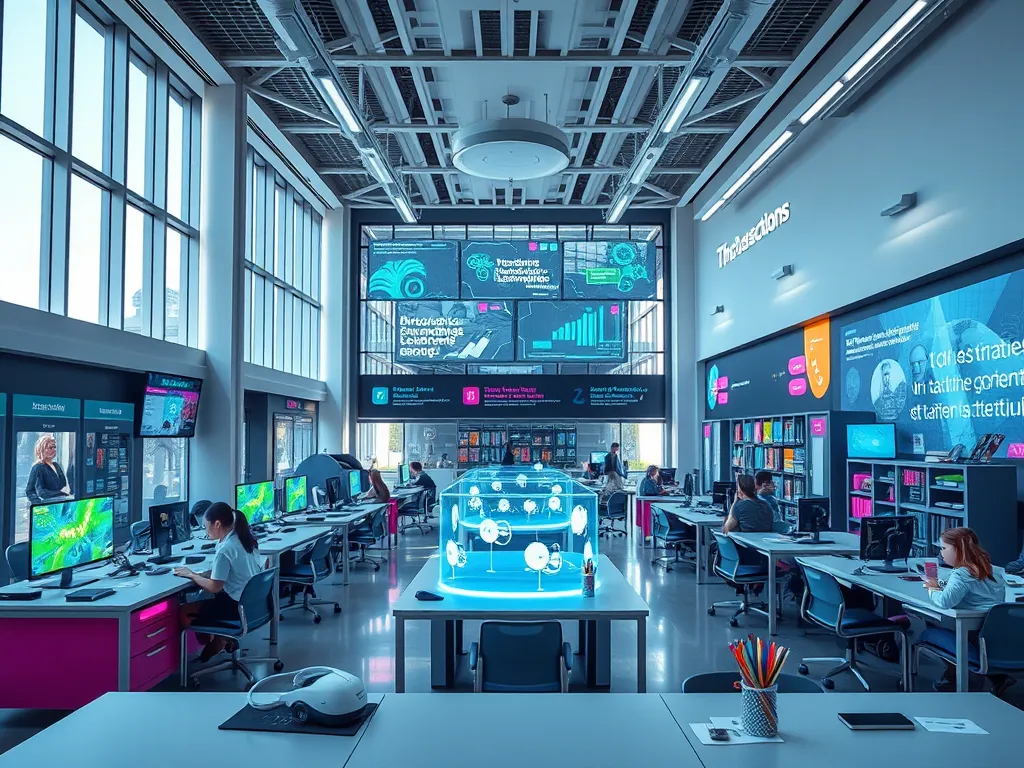
Innovative Learning Programs: Transforming Education for the Future
Innovative Learning Programs are changing the way students engage with their education, offering new methods and technologies to enhance learning outcomes. By employing approaches such as project-based learning, personalized learning, and digital platforms, these programs adapt to the diverse needs of students, fostering critical thinking and creativity.
One of the most significant aspects of Innovative Learning Programs is their emphasis on collaboration and real-world applications of knowledge. This not only makes learning more engaging and relevant but also prepares students for the complexities of modern life. Schools and educational institutions are increasingly recognizing the importance of equipping students with the skills necessary to thrive in a rapidly changing world.
Innovative Learning Programs also integrate technology into the classroom, allowing for a more interactive and dynamic learning experience. Digital tools and online resources enhance accessibility, enabling students to learn at their own pace and explore subjects of interest in depth. This technological shift is reshaping traditional educational paradigms and creating more inclusive learning environments.
Moreover, these programs often encourage students to take ownership of their learning journey. By promoting self-directed learning, students become more motivated and invested in their education, leading to better academic performance and personal growth. Innovative Learning Programs are not just about improving grades; they are about fostering a love for learning and preparing students for lifelong success.
In conclusion, Innovative Learning Programs are at the forefront of educational advancement. They embrace the changing landscape of learning and provide students with the tools they need to succeed. As we continue to explore and implement these innovative approaches, we can look forward to a more engaged, skilled, and adaptable generation of learners.
Digital Learning Platforms: Expanding Educational Horizons
Digital Learning Platforms have revolutionized the educational sector by offering learners access to a wealth of resources at their fingertips. These platforms provide flexibility in learning, allowing students to engage with material anytime and anywhere. This flexibility caters to diverse learning styles and meets the needs of non-traditional students.
Some of the top digital learning platforms of 2023 include Coursera, Khan Academy, Udemy, and edX. These platforms offer a variety of courses that span multiple disciplines, making quality education accessible to a broader audience. They also often feature collaborative tools that encourage peer interaction and knowledge sharing.
When comparing traditional vs digital learning methods, the former typically involves face-to-face instruction with a fixed schedule, while digital learning allows for self-paced study and personalized learning paths. Digital methods can cater to a wider range of needs but may also lack the immediate feedback and support found in traditional classrooms.
Educational institutions are increasingly adopting Innovative learning programs to enhance creativity and engagement among students.
The future trends in digital education technology include increased use of artificial intelligence for personalized learning, augmented reality for immersive experiences, and gamified learning to boost engagement. These advancements promise to create more personalized and effective learning opportunities for students around the globe.
Success stories from digital learning initiatives abound, with institutions reporting improved student performance and engagement. For instance, district-wide implementations of digital learning platforms have led to increased completion rates among at-risk students, showcasing the potential of these programs to bridge educational gaps.
Personalized Learning Approaches: Tailoring Education to Individual Needs
Personalized Learning is an educational approach that tailors learning experiences to meet individual student needs, strengths, and interests. This approach recognizes that students learn differently, and therefore, provides customized pathways for achievement, leading to more effective learning outcomes and increased student satisfaction.
Tech tools facilitating personalized education include adaptive learning software and learning management systems (LMS) that monitor student progress and provide tailored resources. Technologies such as data analytics can track performance and suggest personalized learning goals, creating a more responsive educational experience.
Case studies on personalized learning success show significant improvements in student engagement and academic achievement. For example, schools that adopted personalized learning models reported a 20% increase in student test scores and higher levels of enthusiasm toward learning, demonstrating the efficacy of tailored approaches.
Despite its advantages, implementing personalized programs comes with challenges, such as the need for extensive teacher training and adequate technology infrastructure. Educators must be equipped to personalize learning effectively, which can mean significant shifts in teaching practices and additional support for students.
The future of personalized education strategies looks bright, with advancements in AI and machine learning expected to further enhance personalization in classrooms. As schools continue to embrace technology and data-driven decision-making, personalized learning will likely become a more standard feature of educational practices.
Project-Based Learning: Engaging Students through Real-World Applications
Project-Based Learning (PBL) is a teaching method that encourages students to learn by engaging in real-world and personally meaningful projects. This hands-on approach fosters critical thinking, creativity, collaboration, and communication skills, essential competencies for today’s workforce.
Examples of successful project-based programs include initiatives where students solve community issues, create entrepreneurial projects, or participate in environmental sustainability efforts. These projects not only make learning relevant but also allow students to see the impact of their work in the community.
The benefits of hands-on learning experiences are many, including increased student motivation, improved retention of knowledge, and the development of practical skills. Through PBL, students gain insights into subjects by applying their learning in tangible, real-life contexts.
Integrating project-based learning into curriculums can be achieved through interdisciplinary themes where different subject areas converge around a common project focus. This integration enhances the learning experience, fostering connections between concepts and encouraging deeper understanding.
The role of educators in project-based learning is pivotal; they act as facilitators and guides, helping students navigate through their projects while encouraging autonomy and creativity. The teacher's ability to provide support and mentorship enhances the effectiveness of project-based learning initiatives.
Gamification in Education: Boosting Engagement through Game Elements
Gamification in education involves the incorporation of game design elements in learning environments to enhance student engagement. By utilizing elements such as points, badges, and leaderboards, educators can create interactive and competitive learning experiences that motivate students to participate actively.
Some of the top gamification tools for educators include Kahoot!, Classcraft, and Quizizz. These tools offer interactive quiz frameworks and game-like environments that make learning enjoyable and competitive, boosting overall student participation in the classroom.
Examples of successful gamified learning environments can be seen in classrooms where game-based learning has transformed student interactions. Schools that adopted gamification reported improvements in attendance, engagement, and overall student achievement, proving the effectiveness of such strategies.
Challenges in implementing gamification strategies may arise from concerns over the educational value of games versus traditional learning methods. Teachers need to strike a balance between fun and educational content while ensuring that learning goals are met through gamification.
The future of gamification in education looks promising with advancements in technology allowing for more immersive and interactive experiences. As educators continue to explore innovative approaches to keep students engaged, gamification is expected to become increasingly prevalent in educational practices.
Immersive Learning Experiences: The Next Frontier in Education
Immersive Learning Experiences involve creating engaging environments where students can interact with content in a three-dimensional space. Technologies such as virtual reality (VR) and augmented reality (AR) allow learners to dive deep into subject matter, experiencing concepts in a way that traditional methods cannot provide.
The benefits of virtual reality in education are compelling, including heightened engagement, improved retention rates, and the ability to experience scenarios that may be impossible in a traditional classroom. For example, VR can transport students to historical events or allow them to explore the intricacies of the human body in 3D.
Examples of immersive learning projects have gained traction, such as virtual field trips to explore geological formations or simulations of scientific experiments. These projects create memorable learning experiences that foster a deeper understanding of complex subjects.
Challenges of implementing VR in classrooms include high costs, the need for specialized equipment, and potential technical difficulties. Educators must also be trained to effectively integrate this technology into their teaching practices, which may require substantial investment and preparation.
The future potential of immersive education is vast, as advancements in VR and AR technologies continue to evolve. As these tools become more accessible and affordable, immersive learning experiences will likely play an increasingly vital role in shaping the future of education.
